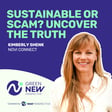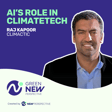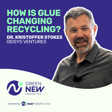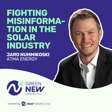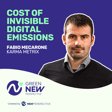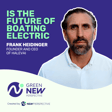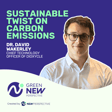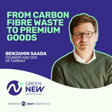
Decoding Greenwashing: A Dive into Environmental Communications
Get ready for an insightful journey into the realm of sustainability and communications with our esteemed guest, Angela Boskovic, an authority in environmental communication and the founder of EcoCore and LLC. We promise to equip you with a sound understanding of environmental communication, a discipline that dissects humanity's perception of nature and the content that arises from these perceptions. This episode also throws light on the global issue of greenwashing, the process by which a company misleadingly presents itself as more sustainable than it actually is, and we discuss ways to hold such businesses accountable.
We turn the spotlight onto deceptive marketing strategies in the sustainable product sector, as Angela reveals how corporations use percentages, natural ingredients, and hollow eco-claims to appear greener than they actually are. We also scrutinize the misuse of the term "eco" in product labeling and how such branding can misguide the consumer, while also addressing the role of regulatory bodies in curbing the abuse of ESG (Environmental, Social, and Corporate Governance) standards as a marketing tool.
Lastly, we underscore the urgency of clear and honest eco-communications, emphasizing that businesses should start from a negative standpoint in their journey towards sustainability. We investigate the role of ethical marketing in promoting sustainability, discourage the use of shaming techniques in customer communications, and illustrate how businesses can leverage transparency and ethical communication to safeguard their market presence in the future. This episode is a must-listen for those seeking to understand the complex interplay between communications and sustainability.
🕑 💡 KEY MOMENTS
==================
(0:00:10) - Communications and Greenwashing in Sustainability
(0:11:24) - Deceptive Marketing in Sustainable Products
(0:19:23) - The Importance of Transparent Eco Communications
(0:31:07) - The Importance of Sustainable Business Practices
🌍 SUSTAINABILITY PODCAST CREATED BY NEW PERSPECTIVE
========================
This podcast is proudly sponsored by New Perspective Marketing, a dynamic growth marketing agency in Boston, MA, celebrating 20 years in business. We help sustainably focused B2B organizations grow their brands and scale up revenue. If you or your organization is looking to grow, visit npws.com for more info.
🎧 SUBSCRIBE TO OUR PODCAST
===========================
- Spotify: https://bit.ly/3PSWIyI
- Apple Podcasts: https://bit.ly/3RvlHte
- Youtube: https://bit.ly/3RDzkXg
- Google Podcasts: http://bit.ly/465gjS5
- Deezer: https://bit.ly/3PvQaof
- Amazon Music: https://bit.ly/3PQlijS
- Zencastr: https://bit.ly/48xt75s
💬 FOLLOW US ON SOCIAL MEDIA
============================
- Instagram: https://www.instagram.com/greennewperspective/
- Twitter: https://twitter.com/gnperspective
- Facebook: https://www.facebook.com/greennewperspective
- LinkedIn: https://www.linkedin.com/showcase/greennewperspective/
- TikTok: https://www.tiktok.com/@greennewperspective
- Threads: https://www.threads.net/@greennewperspective
#sustainabilitypodcast #cleanenergy #greennewperspective #sustainability #cleanenergy #podcast #cleantech
